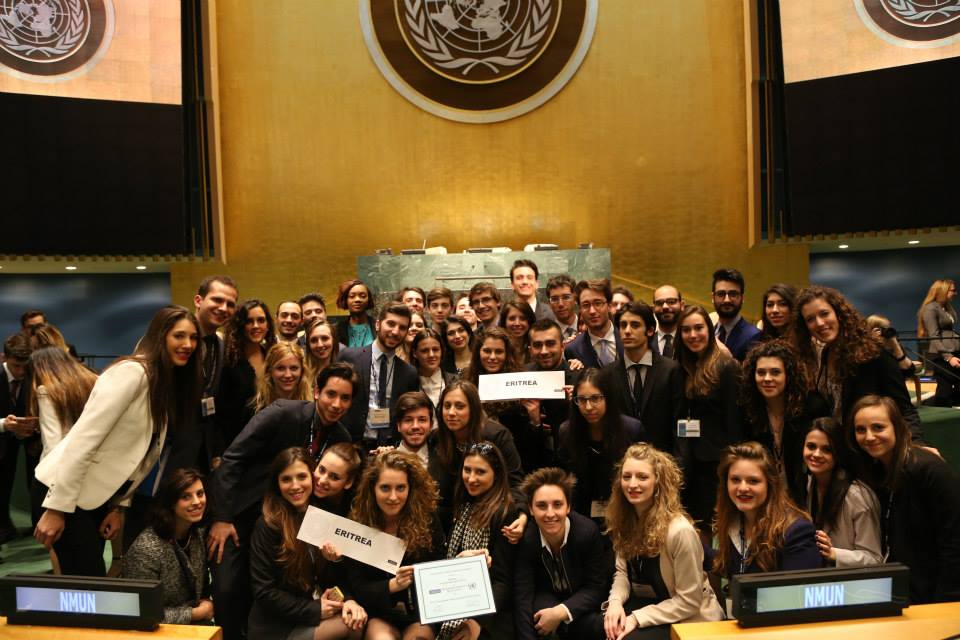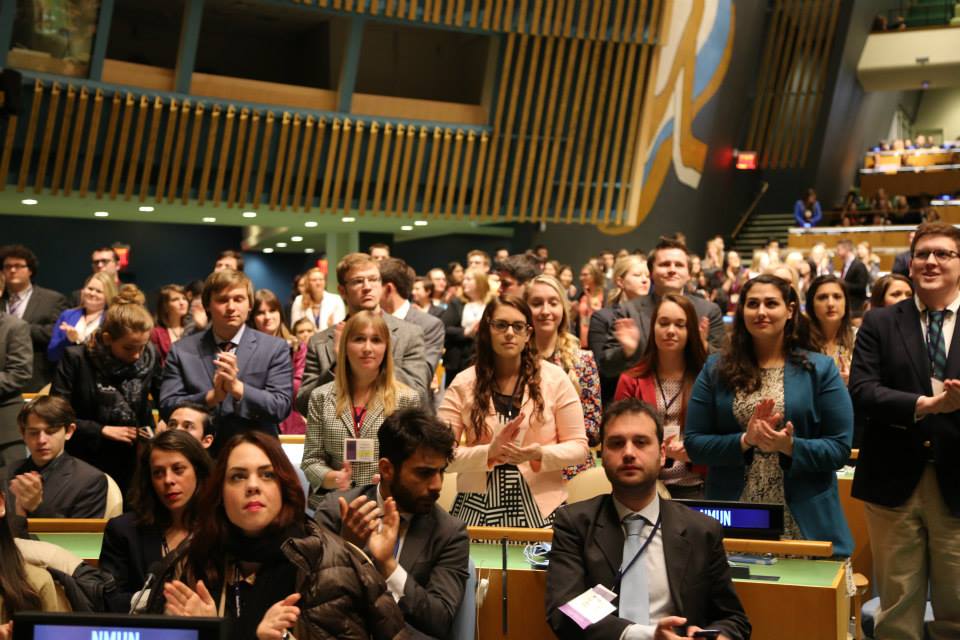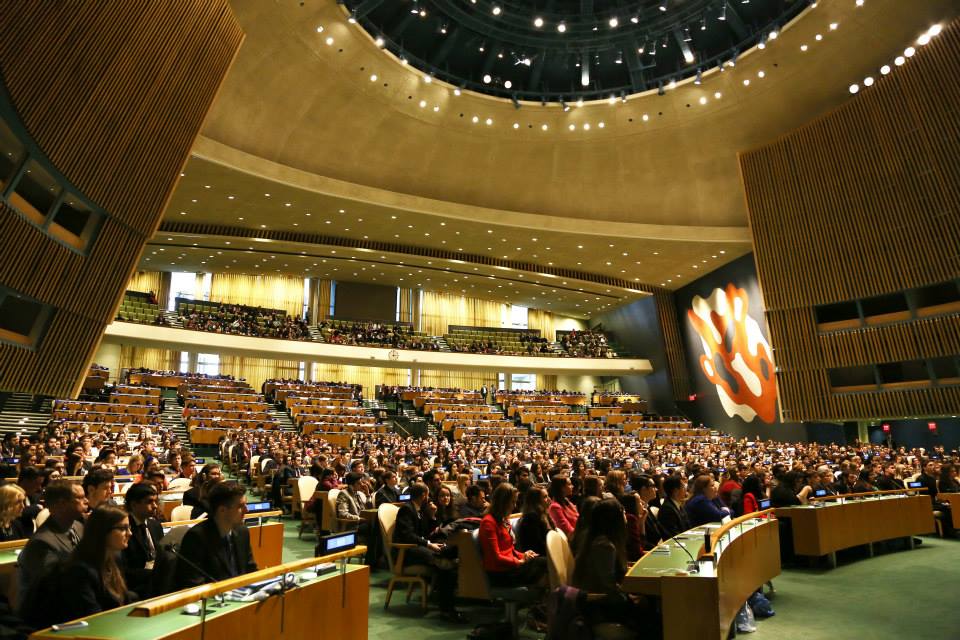By Jasmin Justo
In the city that never sleeps, over 5,000 students from a multitude of universities, travel to one place, to participate in one of the most competitive and international competitions in the world. The National Model UN is a bi-annual competition hosted by the National Collegiate Conference Association, which grants students from colleges and universities to participate in real United Nation committee simulations to find solutions to prevalent global problems. The first conference of the NMUN 2015 took place in the Sheraton Hotel in New York City from March 22 to March 26 and the second conference from March 27 to March 31.
On the first day of the conference, the National Model UN Secretary General Roger H. Tseng and Theo Thieffrey, gave a warm welcome to the 2,500 students participating in the first part of the competition. They spoke of the wonderful opportunity it is for the students to be able to participate in a highly competitive program in which they could not only gain important skills such as negotiation and leadership, but also learn how they as global citizens can make an impact in the world at a global scale.
Former Secretary-General of the UN, Ambassador James E. Jonah, gave an inspirational and thought provocative speech about the great responsibility and duties that the future generation holds as global citizens in making the world a better place. He also spoke of the responsibility of future delegates to continue the United Nations mission to promote international cooperation and peace to the world especially with the current issues with the United Nations system, including the veto question, “Why should only five nations have the veto power?”. Following the ambassador’s speech, Michael Eaton, Executive Director of the NCCA/NMUN, held a memorium for the former faculty advisor of the National Model UN, Honorable Joseph H. Melrose, Jr. Honorable Melrose Jr. dedicated his life to the US Foreign Service. Working for approximately four decades, he participated in peace missions across the globe and worked diligently in finding real solutions for real problems. One of his many accomplishments include forging peace with the Lome Peace Accord and ending hostilities in Sierra Leone. Known for his easygoing attitude and great respect he had for everyone, his son and granddaughter officially commenced the NMUN 2015 competition in his honor.
The NMUN is composed of 21 committees, each dealing with a specific global issue. I was part of the United Nations Educational, Scientific, and Cultural Organization (UNESCO) committee representing the Federative Republic of Brazil. On the first day, all committees have to attend the meeting and set the agenda for which the topics will be discussed. This process requires dialogue between Member States to determine which topic will be chosen first which can last a few hours in small committees or the whole day in larger committees such as the 1st General Assembly with over 100 delegations representing their countries. Once the agenda is set, there is a speaker’s list that allows each delegation from each country to speak approximately one minute about the chosen topic. This time for speeches gives delegates the opportunity to gain insight in each countries’ perspective on the issue and to gauge in potential alliances. In between intermissions, delegates begin to forge alliances and begin collaborating on drafts for resolutions.
During the four days, delegates also have a chance to attend panels and workshops hosted by journalists, policy advocates, and human rights activists. One of the panels I attended was, “The Impact of the Media in International Affairs”. This panel hosted by Pamela Falk, CBS News Foreign Affairs Analysts, and Robert Windrem, NBC News investigative reporter, featured professional journalists and their perspective of media’s role in today’s digital world and how it has impacted the traditional way of gathering information in journalism through their own experiences; Wayne Cabot from CBSNews Radio, Somini Sengupta, an international correspondent for the NY Times, Sang Won Yoon, diplomatic correspondent from Bloomberg News, and Ayman Mohyeldin, foreign correspondent reporter from NBCNews.
During the last two days, groups within the committee revise and edit drafts through the head delegates before the final day when delegates submit their final resolution papers for voting. Once voting is completed, delegates are awarded outstanding position paper awards and best peer award for their performance in the conference.
The closing ceremony took place at the United Nations General Assembly Hall where Ban-Ki Moon, the current Secretary- General of the United Nations, made a surprise visit and introduced his International Happy Day video. He gave an awe-inspiring speech, encouraging the delegates to become global citizens to help in the shaping of a better tomorrow before departing for his meeting. “Now I call on you to transform your understanding into action. The United Nations is your global platform. You do not have to be a diplomat or a politician to advance our work. Everyone with a phone can be a human rights monitor. Everyone with a screen name can mobilize their friends. All of you can shape the future.”
Afterwards, the Executive Director of the NMUN, Michael Eaton, announced the best and outstanding delegation awards, finalizing the conference.
To view more photos or posts from the NMUN Conference visit: twitter.com/theofficialnmun
Facebook.com/NationalModelUN
To view Ban-Ki moon’s Happy Day video: https://www.youtube.com/watch?v=WXJd7SttpU0
For more information about the competition visit their official website: nmun.org




Leave a Reply